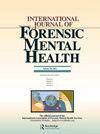Trajectories and Outcomes of Those Not Criminally Responsible on Account of Mental Disorder through a Canadian Forensic System
IF 0.9
4区 医学
Q3 CRIMINOLOGY & PENOLOGY
International Journal of Forensic Mental Health
Pub Date : 2022-01-05
DOI:10.1080/14999013.2021.2023708
引用次数: 1
Abstract
Abstract Canadians adjudicated Not Criminally Responsible on Account of Mental Disorder (NCR) are detained in forensic psychiatric hospitals under a jurisdictional review board (RB) governed by the Canadian Criminal Code. The custody and management of NCR populations are administered independently across jurisdictions despite being federally legislated, and research is limited on how RBs may vary in their efforts to balance public safety and social reintegration across cases, settings, and provinces. To this end, the trajectories and outcomes were investigated in one understudied Canadian RB system on a sample of NCR individuals (n = 109) and compared to other provincial practices. A retrospective longitudinal design was employed to track an NCR cohort between 2005 and 2010 until 2015. Results demonstrated that the provincial RB aligned their operational and management practices with federal legislation, but unique deviations contributed to novel NCR trajectories and outcomes under RB supervision that were conservative relative to provincial partners. Dispositions varied as a function of risk level and were informed by clinician recommendations. Detention length differences were observed between ancestral lines, as the White ancestral group spent an average of three years less in custody than the Nonwhite ancestral group despite limited differences in demographic, clinical, and criminogenic profiles. Further research is required on NCR trajectories and outcomes across other understudied provinces and the role of forensic risk instruments in assisting with the consistent application of federal law.通过加拿大法医系统对精神障碍无刑事责任的人的轨迹和结果
被裁定因精神障碍(NCR)不负有刑事责任的加拿大人被拘留在由加拿大刑法管辖的司法审查委员会(RB)管辖的法医精神病院。尽管有联邦立法,但NCR人口的监护和管理是跨司法管辖区独立管理的,并且关于RBs如何在不同案件、环境和省份平衡公共安全和社会融合方面的努力有所不同的研究有限。为此,在一个未充分研究的加拿大RB系统中,对NCR个体样本(n = 109)进行了轨迹和结果调查,并与其他省的做法进行了比较。采用回顾性纵向设计追踪2005 - 2010年至2015年的NCR队列。结果表明,省级RB将其运营和管理实践与联邦立法保持一致,但独特的偏差导致了新的NCR轨迹和结果,在RB的监督下,相对于省级合作伙伴来说是保守的。处置随风险水平的变化而变化,并由临床医生建议。在不同的祖先之间,拘留时间的差异被观察到,尽管在人口统计学、临床和犯罪特征方面存在有限的差异,但白人祖先组比非白人祖先组平均少被拘留三年。需要进一步研究其他未充分研究的省份的NCR轨迹和结果,以及法医风险工具在协助一致适用联邦法律方面的作用。
本文章由计算机程序翻译,如有差异,请以英文原文为准。
求助全文
约1分钟内获得全文
求助全文

 求助内容:
求助内容: 应助结果提醒方式:
应助结果提醒方式:


